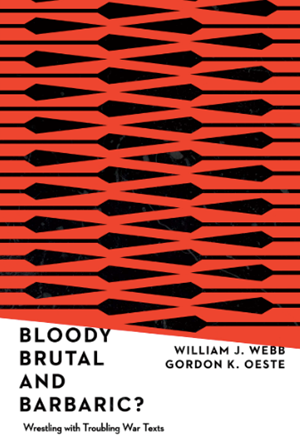Our Reluctant War God

No single collection of texts resolves all the problems connected to God and war in the Old Testament, not even the texts that show Israel’s “redemptive” or “incremental” ethic. But one set of texts, those showing God’s reluctance about war, may well tip the balance for many.
Chp 14 in William Webb and Gordon Oeste’s Bloody, Brutal and Barbaric? Wrestling with Troubling War Texts, turns to those very texts. [Last I looked it was on sale at Amazon for 50% off.]
They contend that God is an uneasy or highly reluctanct war God, and they contend we miss this dimension because (1) we are predisposed to see the war god texts, (2) because we are predisposed to think of military conquest texts, and (3) because God is willingly involved in war at times. “Yahweh the Warrior God” is a theme present in the Bible.
Theologically (and canonically) if we rely only on those we see only those; there are others that have to be factored in, as in Exodus 15:3: “The LORD is a warrior; the LORD is his name.” Their thematic statement:
An investigation into Yahweh as an uneasy/highly reluctant war God reveals a gap and tension between what happens in Israel’s war practices and what God would have truly hoped for. Yahweh’s involvement in Israel’s warfare requires that he leave his lofty untainted home, so to speak, and stoop low,very low, when working with his people. Yahweh accommodates his desired plan-A actions for his people to something closer to the norms and ethics of fallen human beings-yes, even in practices as dreadful as warfare-in order to walk with his people in a broken, sin-stained world, move them gently and incrementally toward something better (partial steps of redemption even in their war practices), and strategically unfold new chapters in the canonical journey to a final Eden (full redemption).

They explore no fewer than nine kinds of texts that illustrate God as a reluctant war God in the Old Testament.
- God creates without conflict (vis a vis ANE conflict creation texts)
- God grieves war violence: Lamentations 5:10-15; Ezek 27:2; Isa 16:9; Jer 48:30-32
- “Killing with kindness”: using light rather than sword: 2 Kings 6; turning the victims into slaves rather than murdering them.
- David’s bloody hands: 1 Chron 22:6-10; 28:3
- David the warrior does not build the temple because of blood on his hands: 1 Chron 17:4-6
- Limiting the king’s power is procuring army horses: Deut 17:14-20
- Rejecting God as king means kings will create war machines: 1 Sam 8
- The loving and forgiving God outweighs the God of punishment: they weight it as about six to one (compassionate, gracious, slow to anger etc vs. punishing). God relents from punishment in the famous passage in Exodus 32:14.
- Faith in armor vs. the armor of faith: 1 Samuel 17 (Goliath story)
They finish with a set of questions:
These subversive war passages and others like them … do not directly overturn the war ethos of the ANE or ancient Israel. However, they do push us to ask, Why does Yahweh shed tears at the destruction of Israel’s enemies? Why is he a weeping war God? Why does he not want a king for his people, and why does he counter with various war liabilities as reasons? Why does Yahweh strictly forbid acquiring ancient-world weapons of mass destruction-horses and chariots-when every other ANE power was trying to acquire them? Why does Yahweh require his people to destroy these highly destructive weapons when they capture them? Why does Yahweh refuse to have the greatest Israelite warrior build him a temple? Why does Yahweh take such ritualized pains to separate his name and reputation from Israel’s prized warrior and instead connect his character with shalom? What ANE god in their right mind would have acted like Yahweh? The subversive war texts in this chapter present a portrait of Yahweh as a highly reluctant war God who is not exactly eager to participate with Israel in its wars. These Old Testament texts inform us of a God who unexpectedly subverts the practice of war among his people.
Jesus Creed is a part of CT's
Blog Forum. Support the work of CT.
Subscribe and get one year free.
The views of the blogger do not necessarily reflect those of Christianity Today.


















